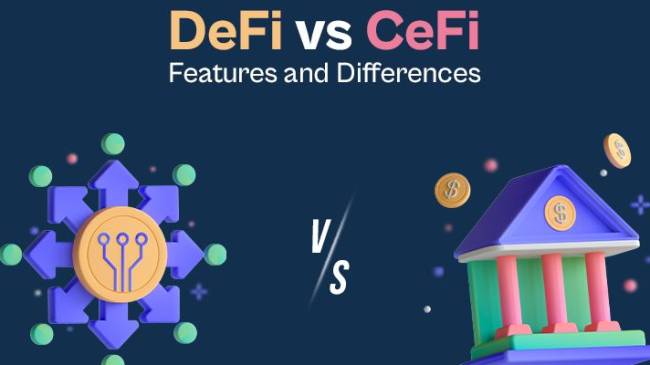DeFi vs CeFi: Comparing Decentralized to Centralized Finance
Different among DeFi vs CeFi
>>> https://uniultra.xyz/blog/defi-vs-cefi
Custody
In terms of custody, DeFi permits clients to have direct manipulate over their belongings while not having to observe for the monetary group to open, no longer like CeFi. However, this comes with a tremendous deal of duty, and besides insurance is underwritten, users bear most of the technological dangers. As a end result, centralized exchanges (CEXs), which are similar to conventional custodians, are famous for retaining cryptocurrency assets.
Trading of crypto assets
When it comes to shopping for and promoting crypto property, CEXs, and DEXs function differently. CEXs use restrict order books, which can be off-chain data of extraordinary orders located via traders. In assessment, DEXs match counterparties in a transaction using automatic marketplace-maker (AMM) protocols. Prices are decided thru mathematical algorithms based totally on transaction volumes.
Execution order malleability
When the use of permissionless blockchains, customers typically percentage their supposed transactions thru a peer-to-peer community. Since there may be no centralized entity controlling the transaction execution order, peers could have interaction in transaction charge bidding contests to persuade the order. This malleability of the order has added approximately the demonstration of numerous market manipulation methods, which can be presently massive on blockchains.
In evaluation, regulatory bodies in centralized finance (CeFi) impose strict regulations on economic establishments and services, along with the implementation of transaction ordering. However, such regulations are possible because of the centralized nature of CeFi's economic intermediaries.
Transaction charges
Transaction fees play a critical feature in DeFi and other blockchain networks by using manner of deterring direct mail. However, no longer like CeFi, where financial institutions can offer transaction services without spending a dime, manner to their potential to depend upon Anti-Money Laundering (AML) verifications in their clients, DeFi platforms ought to charge transaction expenses to ensure the integrity of their community.
Non-forestall market hours
CeFi markets are stated to experience not unusual outages, no longer like DeFi, in which transactions may be processed across the clock. The New York Stock Exchange and the Nasdaq Stock Exchange, the 2 primary buying and selling venues inside the United States, perform from 9:30 am to 4:00 pm Eastern Time, Monday via Friday. On the other hand, DeFi markets are open 24 hours an afternoon, seven days per week, providing non-stop shopping for and selling opportunities for consumers. However, not like CeFi, DeFi lacks pre-and positioned up-marketplace trading, wherein liquidity on severa goods is normally thin during these periods.
Privacy
When it involves decentralized finance (DeFi), proper anonymity is hard to come back through on blockchains that utilize non-privateness-keeping clever contracts. Instead, the ones blockchains best provide a degree of pseudo-anonymity. This lack of anonymity will become specifically applicable when changing fiat coins to cryptocurrency belongings. Centralized exchanges with anti-cash laundering (AML) rules are often the most handy desire for making those conversions. However, this consolation comes with a rate: these exchanges have the strength to reveal the possession of cryptocurrency addresses to regulation enforcement government.
Arbitrage dangers
In order to decrease this danger, arbitrage ought to preferably be finished atomically. However, except arbitrageurs have a unique association with exchanges to make certain atomicity, arbitrage on centralized and hybrid exchanges is generally exposed to market rate volatility.
One way to conduct enormously chance-unfastened arbitrage in the DeFi vicinity is with the useful resource of buying and promoting amongst decentralized exchanges (DEXs) on the same blockchain. This is viable because of the atomicity characteristic of the blockchain, which lets in investors to create a smart agreement that performs the arbitrage and robotically reverts the transaction if it does now not generate a income. However, arbitrage amongst DEXs on separate blockchains incorporates a similar stage of hazard as arbitrage on centralized and hybrid exchanges.
Inflation
Inflation is a phenomenon that takes place whilst the existing foreign money supply loses price due to an inflow of recent forex. While inflation is generally described due to the fact the erosion of a foreign money's shopping power, the correlation among deliver and inflation is not always truthful. Sometimes, an boom within the coins deliver does not result in inflation.
Central banks in CeFi preserve the authority to create fiat cash, and inflation is commonly measured toward a basket of purchaser objects referred to as a client price index. Conversely, DeFi operates on a specific model, wherein the supply of various cryptocurrencies can vary. For example, Bitcoin (BTC) has a finite deliver and is likely to stand the undertaking of sustaining financial interest with out a cap on demand. This can also result in a loss of overseas cash. Furthermore, Bitcoin and different blockchains may be at risk of protection vulnerabilities without a block praise mechanism to incentivize miners.
Follow Uniultra.xyz for more blockchain information!




